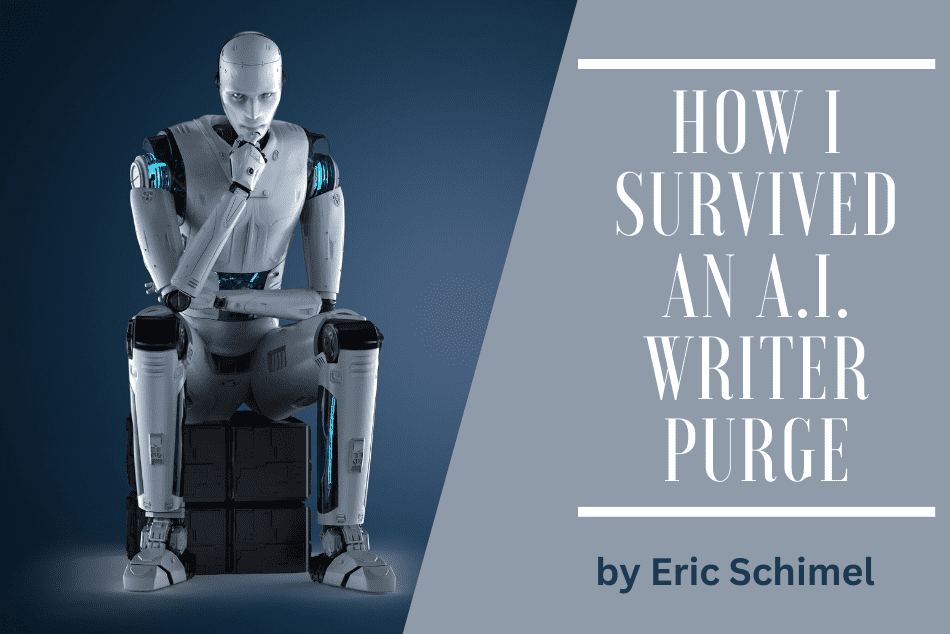by Eric Schimel
If you’re reading this, we likely have a number of things in common. You are probably an aspiring writer, with your head at least partway in the game. People like us are works in progress, we study what makes our writing and selves not only appealing to literary agents, but accessible to them as well. We grow, we change, we adapt, and above all we try not to love our work too much.
If you want to get published, you need to live it. Being an aspiring novelist may be nothing else, but it is definitely a lifestyle. We work at jobs and find time to write. Some of us were writing professionally before we got the bug. You guys must all feast on those stories of writers in peripheral careers, who one day broke through and got published. I envy you that. I’m the other thing, I started writing books one day, and learning how to write about two years later. I was fairly psycho about it, and had all the goofy, commonplace assumptions about how plausible my ascension would be.
Couple of years of rewrites and queries after that, I’m minding my own business (I teach Pilates) and a friend calls me to say he’s bagged a job as the director of communications for a prestigious law firm. He needs words, he wants my help.
I need you to know what that meant to me. I plighted my troth to the physical a long time ago, and I’m in my fifties. I write hard, because I understand that it takes years to learn to write, and my supply is limited. So anything that distinguishes me as an actual writer is unspeakably precious to me. I feel like I’m pretty far behind many of you reading this.
What a great six months! The firm I’m working for primarily helps victims of identity theft and inaccurate credit reporting. My guy would show me whatever the professional writers had written. Then I’d spin up something more bombastic and snooty, and the owner would love it.
I write, they pay. Suddenly me = writer. Good times.
So here’s where the A.I. comes into the picture. A month ago my guy called to say that the firm had just fired all of their other writers at once, and replaced them with ChatGPT. It does adequate work for boilerplate articles about the firm’s work, it just can’t do keywords worth a damn.
My gig-load and pay tripled, and they started hinting at larger projects. Everything was great as long as I suppressed the obvious, logical fear that the demon A.I. was coming for me. I mean, I didn’t really deserve this, did I? All those writers they fired got canned for doing what they spent years and $ learning to do. I only have this gig because I know a guy. It ate at me, gentle reader. How to hold something so important to me, a thing I might not even deserve in the first place? What could I really have that those other writers lacked?
I’m blessed with some really smart friends, I know some computer people. I called one who understood how A.I. works well enough to explain some of its aspects to me. After he’d asked me to calm down, he replayed my feelings back to me.
He said, “So the A.I. app replaced all the other writers at this firm. Besides keywords, you don’t know why they kept you, but you want them to keep doing it, right?”
“Yes! I want to keep this gig, very much.”, I replied.
“Then just keep being yourself, you’ll be fine.”
It is often difficult to know if you are communicating properly with extremely smart people. I said, “But how? What does ‘be myself’ mean in this case?”
“You want to write books, right? You want people to read those books and say ‘I really liked that book, it was well written.’ Right?”, like most big brains, he was getting impatient early.
“You could put it like that.” I allowed.
“Admit it, you want people to like your writing. Yes or no?” Computer people can be so binary.
“Fine. Yes, I want people to like me.”
He laughed. “That’s your strength, the A.I. just wants to fit in.”
“What?”
“Dude, it’s like you were back in grade school. The teachers are stupid and the classes are standardized for them to grade you on. Most kids just try to give the teachers what they expect, but you were a pain in the ass, weren’t you?”
“Maybe.”
“Come on, library boy! You would include cool words or classic turns of phrase in your little essays, yes? Just trying to show off, or drive the teacher to a dictionary, or otherwise prove how smart you were…right?”
It is not best to deny extremely smart people their little victories. I said, “Yes.”
“There you have it.”, he yelled. “A.I. is the kid who couldn’t even understand why you would want to. It just gives the teacher what they expect, anything else is a waste.”
“Why does it want…”
“Look, A.I. doesn’t want sh*t. It sequences words from a large language model based on an analysis of what the next most likely following word might be. It has infinite recall of the writing it’s seen, and will match what word it writes next to whatever word has most been written next before. Get me?”
“Mostly.”
“Think about it. You are working your way down a list of cooler, and thereby rarer words. The A.I. is working its way up a list of words to find the most commonly used ones. The difference in your goals is what produces the distinction.”
“Okay, but all those other writers must have had similar personal evolutions. Why am I the last one standing?”
“Because you think you’re special, I imagine. You probably have some fantasy of actually writing something new…”
“Hey…”, I interrupted.
Smart people don’t wait. “It’s adorable and statistically absurd.”, he said. “However, it causes you to write in a way that A.I. won’t. At least not for a while.”
“How long?”
“You got a few years, maybe. You still teach Pilates, don’t you?”
The rest of the conversation was about how even the best A.I. detectors, which are themselves A.I. programs, are really not so good at detecting A.I. through text. And that those failed detection programs will probably become great tools to make A.I. writing more undetectable. It was depressing in that born-into-the-wrong-time way.
I hate to admit it, all of this sucked the joy from my world for the next few weeks. Everything was fine, the work flowed and I kept up, but it all gnawed at me. I didn’t know how to enjoy something that was apparently already doomed in the foreseeable future. Both of my jobs began to suffer from this distraction.
It was stupid, like the sad ending of a good fairy tale, but finally I had to ask. Last night I called my guy and asked him, point-blank, “Mark, why me? Why am I the only one who didn’t get replaced by the A.I.?”
“I told you, Eric. ChatGPT can’t integrate keywords, so nothing it writes increases our SEO scores.”
“So that’s it?”, I asked. “It’s not my writing, it’s just that I can bolt keywords onto what I produce? How long until the programs can do that, too?” My guy is also my friend, he saw my fears and read me rightly.
Mark said, “Dude, calm down. They love you here.”
“But why?”
“Because whenever any project is done, we can run it by you and you’ll sprinkle it with righteous indignation. Then it’s really done, and ready to go onto the website. Relax, man. They love you.”
So there you have it, kids. The one thing that keeps me my gig writing for a prestigious law firm, when the A.I. came for everyone else, is that I’m pissed off. I’m wordy, I’m self-important, and I’m pissed.
Sleep tight, sugarplums.
 A philosophy graduate of Boston University, Eric has written plays and poetry since ‘95. Living mostly in Austin, TX, his work has been nominated for a B. Iden Payne Award, and he won a critic’s choice award at Fronterra Fest. Eric started writing novels in 2018, and began attending seminars and studying writing not too long after that. He teaches Pilates and writes most days. He also writes articles for a consumer protection law firm in NYC, which is at the center of this story.
A philosophy graduate of Boston University, Eric has written plays and poetry since ‘95. Living mostly in Austin, TX, his work has been nominated for a B. Iden Payne Award, and he won a critic’s choice award at Fronterra Fest. Eric started writing novels in 2018, and began attending seminars and studying writing not too long after that. He teaches Pilates and writes most days. He also writes articles for a consumer protection law firm in NYC, which is at the center of this story.





